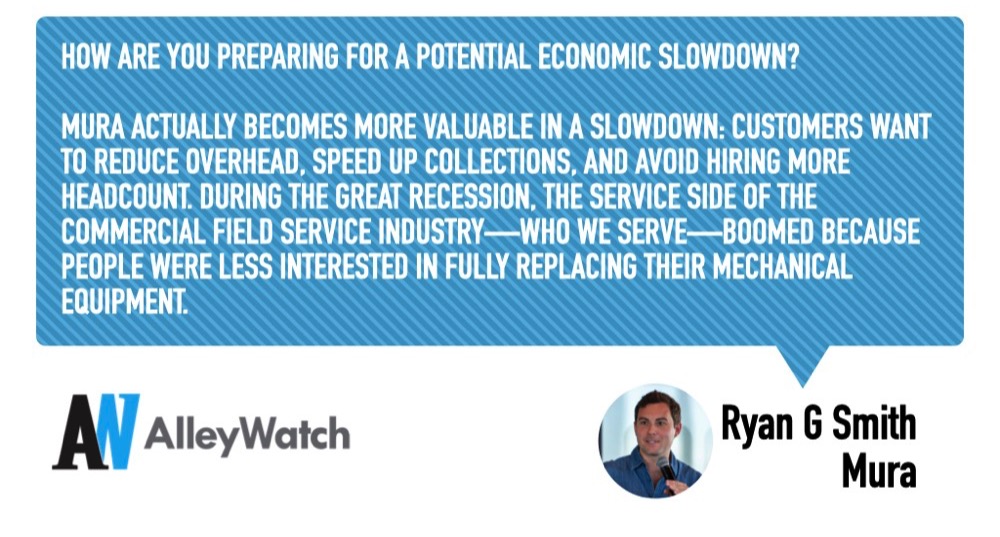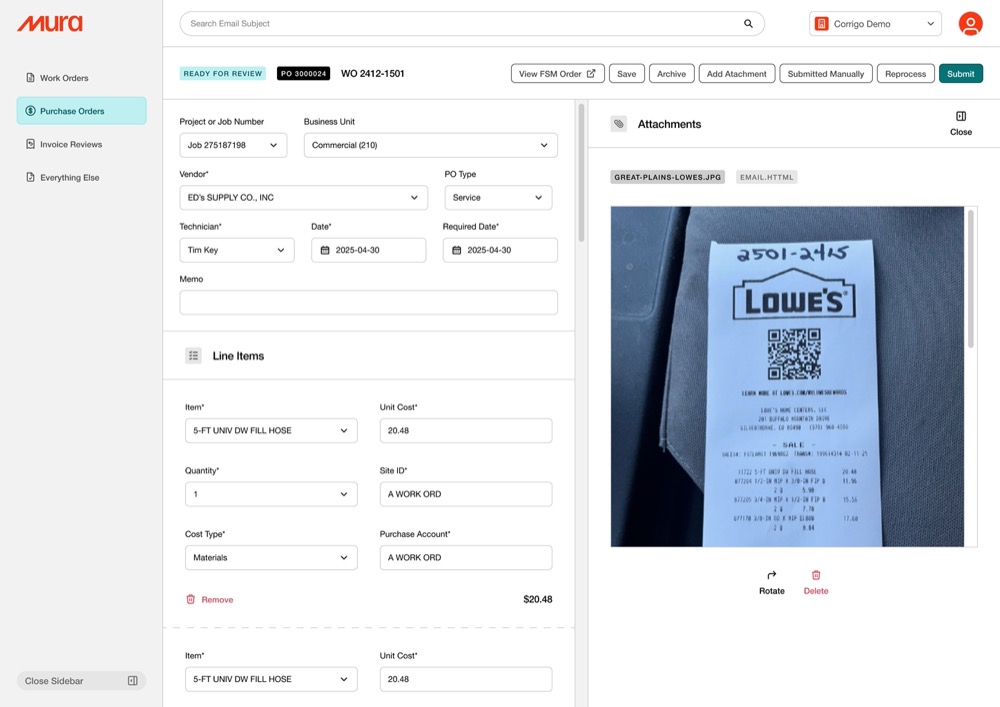Commercial field service companies in sectors like HVAC, electrical, and plumbing face significant operational challenges with manual data entry, slow payment cycles, and inefficient back-office processes that drain resources and impact cash flow. Despite being essential infrastructure that keeps America running, these businesses often struggle with outdated systems and high Days Sales Outstanding (DSO) while juggling increasing service demands. Mura addresses these pain points with its AI-powered “dark software” platform that seamlessly integrates with existing field service management systems to automate the order-to-cash process. Instead of requiring disruptive platform changes, Mura works behind the scenes to help commercial service providers get paid faster, reduce overhead, and eliminate manual data entry in dispatch and billing. One customer has already reported an 80% decrease in time spent on purchase order processing while significantly reducing downstream accounting and billing errors.
AlleyWatch sat down with Mura CEO, Cofounder, and serial entrepreneur (Cofounded Leaflink) Ryan G Smith to learn more about the business, its future plans, and recent funding round
Who were your investors and how much did you raise?
We’ve raised $1.5M in our pre-seed round led by Lerer Hippeau and Levante Capital. A few months later, we raised our heavily oversubscribed $4.5M seed round co-led by Lerer Hippeau and Level One Fund.
Tell us about the product or service that Mura offers.
Mura automates the order-to-cash process for commercial field service companies—think HVAC, electrical, and plumbing—using AI and deep integrations. We help them get paid faster, reduce overhead, and eliminate manual data entry in dispatch and billing. It’s automation for the people who keep America running.
What inspired the start of Mura?
 Claire DeRoberts (cofounder) and I previously launched LeafLink, the B2B cannabis marketplace that now handles over 80% of wholesale cannabis orders in the U.S. After building that industry-standard platform in a novel space, we began our search for a novel opportunity in a changing space.
Claire DeRoberts (cofounder) and I previously launched LeafLink, the B2B cannabis marketplace that now handles over 80% of wholesale cannabis orders in the U.S. After building that industry-standard platform in a novel space, we began our search for a novel opportunity in a changing space.
Several months ago, we shadowed the night shift at an offshore back-office agency in the Philippines and watched a team of 250 people manually entering and processing service orders for commercial field service companies. It looked similar to what we solved in cannabis around B2B orders, so we started building automations for the manual work done by those teams. This time, we can build more powerful technology even faster, thanks to advances in AI and LLMs that didn’t exist when we built LeafLink.
What does Mura mean?
Mu·ra | \ ˈmü-rə \ is a Japanese word that means seeking out irregularities and unevenness in workflows to eliminate inefficiency.
It perfectly encapsulates what we do with our technology for our customers!
How is Mura different?
Our product vision is deeply rooted in the “dark software” approach. We’re not trying to replace our customers’ systems; we plug into them to make their existing technology stack and team more efficient. Mura integrates with our clients’ field service management systems (FSMs) and billing tools, automating workflows invisibly in the background.
We’re focused on one thing: helping commercial service companies reduce overhead and get paid faster by automating their existing processes—not forcing a tech transformation. AI is at the core of how Mura works, but at the end of the day, our customers only care that we’re making them more effective at what they do.
What market does Mura target and how big is it?
We target commercial field service companies—a $300B+ market in the U.S. alone—with a focus on HVAC, electrical, and plumbing. Most of these companies are PE-backed or family-run and underserved by modern software, let alone the latest in LLMs.
What’s your business model?
We charge a transaction fee with a powerfully clear ROI for our clients. We do not believe in flat SaaS fees for companies with the latest technology at their core. Our customers want to understand the value of what we’re supplying them—clear returns on time and money saved—and that aligns with Mura’s model.
How are you preparing for a potential economic slowdown?
Mura actually becomes more valuable in a slowdown: customers want to reduce overhead, speed up collections, and avoid hiring more headcount. During the Great Recession, the service side of the commercial field service industry—who we serve—boomed because people were less interested in fully replacing their mechanical equipment.

What was the funding process like?
Highly collaborative with some of the highest integrity, best investors we’ve worked with over the last 10 years. We moved quickly because the problem was clear, our team the absolute best builders we know, and we signed industry-leading customers early.
What are the biggest challenges that you faced while raising capital?
Limiting the size of the round and telling people “No”.
What factors about your business led your investors to write the check?
The team, the team, the team. We found a gargantuan opportunity with wonderful clients, but this early in the building process, it’s mostly a character bet—who is at the wheel? Getting to build alongside Claire again, who was the most dynamic builder at LeafLink, and James, who has built exceptional tech with AI at its core for years, is exceptional.

What are the milestones you plan to achieve in the next six months?
We’ve closed a few of the largest PE-owned operators in the commercial field service space, so through the end of the year, we are spending time, literally in-house with their amazing teams, to quickly iterate on our product as we gear up for a larger rollout in ’26. This is exactly the same approach we took in the early days at LeafLink—become part of your customers’ team, on-site and on-call.
What advice can you offer companies in New York that do not have a fresh injection of capital in the bank?
Stay close to your customers—focus on pain, not polish. Build something that saves time or makes money—ideally both.
Where do you see the company going in the near term?
We’re heads down turning early wins into repeatable outcomes. That means deeper automation, more integrations, and growing within PE portfolios that manage dozens of service companies. Our ambitions are big, but the work is grounded: deliver value every week for our customers.
What’s your favorite spring destination in and around the city?
Last weekend we kicked off the summer with a Century Ride to Montauk—super fun challenge, got a solid sunburn, and were able to hang at the beach for a couple days.


